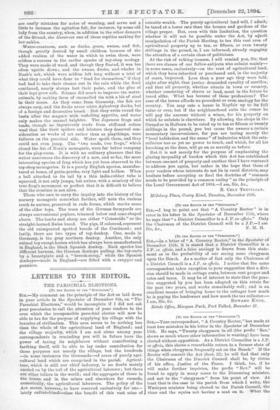LETTERS TO THE EDITOR.
THE PAROCHIAL ELECTIONS.
[TO THE EDITOR OF THE "SPECTATOR:1
Sin,—My comment on the principle of the Act as laid down in your article in the Spectator of December 8th, on "The Parochial Elections," would be incomplete if I did not ask your permission to call the attention of your readers to the area which the irresponsible parochial elector will now be able to tax for the purpose of supplying his village with the luxuries of civilisation. This area seems to be nothing less than the whole of the agricultural land of England; and the village majority, which I am not alone among your correspondents in reminding you will in future have the power of taxing its neighbours without contributing a farthing itself, will be able to lay under contribution for these purposes not merely the village, but the hundreds —in some instances the thousands—of acres of purely agri- cultural land which are comprised in the parish. Agricul- ture, which is still our chief industry, is no doubt mainly carried on by the toil of the agricultural labourer ; but there are other toilers in the world ; and the aggregate of those in the towns and in the mines and elsewhere far exceeds, numerically, the agricultural labourers. The policy of the Act seems, however, to have reserved exclusively for one— lately enfranchised—class the benefit of this vast mine of rateable wealth. The purely agricultural land will, I admit, be taxed at a lower rate than the houses and gardens of the village proper. But, even with this limitation, the question whether it will not be possible under the Act, by adroit manipulation of the Parish Meeting, to tax this vast area of agricultural property up to ten, or fifteen, or even twenty shillings in the pound, is, I am informed, already engaging the attention of a certain class of politicians.
At the risk of talking treason, I will remind you, Sir, that there are classes of our fellow-subjects who subsist mainly— in some cases, exclusively—on the rent of agricultural land, which they have inherited or purchased and, in the majority of cases, improved. Less than a year ago they were told, night after night, that justice demanded equality of sacrifice, and that all property, whether situate in town or country, whether consisting of shares or land, must in the future be. taxed alike. What has become of these professions P The case of the towns affords no precedent or even analogy for the country. You may rate a house in Mayfair up to its full value or over, but if the neighbourhood suits the owner he will pay the amount without a wince, for his property on which he subsists is elsewhere. By allowing the shops in the Strand or in Holborn to be rated up to ten or fifteen or twenty shillings in the pound, you but cause the owners a certain momentary inconvenience, for you are taxing merely the "local habitation and the name" of industries which the rate- collector has as yet no power to touch, and which, for all hia knocking at the door, will go on as merrily as before.
But it is not merely for the purpose of emphasising the glaring inequality of burden which this Act has established between one sort of property and another that I have ventured to address you again, but rather in the hope that those of your readers whose interests do not lie in rural districts, may hesitate before accepting as final the doctrine of "common needs to be provided by a common outlay" as the principle of the Local Government Act of 1894.--I am, Sir, &c.,

































 Previous page
Previous page